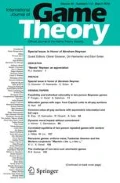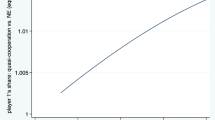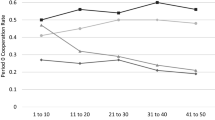Abstract
In repeated games, cooperation is possible in equilibrium only if players are sufficiently patient, and long-term gains from cooperation outweigh short-term gains from deviation. What happens if the players have incomplete information regarding each other’s discount factors? In this paper we look at repeated games in which each player has incomplete information regarding the other player’s discount factor, and ask when full cooperation can arise in equilibrium. We provide necessary and sufficient conditions that allow full cooperation in equilibrium that is composed of grim trigger strategies, and characterize the states of the world in which full cooperation occurs. We then ask whether these “cooperation events” are close to those in the complete information case, when the information on the other player’s discount factor is “almost” complete.



Similar content being viewed by others
Notes
The results would not change if we used perfect Bayesian equilibria instead of Bayesian equilibria.
Similar though slightly weaker results to the ones we obtain below can be proven when the players have incomplete information regarding their own discount factor as well as the other player’s discount factor. However, the assumption that a player knows his own discount factor is natural in many applications, and it allows us to concentrate on the impact of incomplete information on the other player’s discount factor.
So that \(\Sigma _i\)-measurability of strategies is well defined, one needs to introduce a topological structure on the space of courses of actions. In this paper we will study only a simple type of strategies, conditional grim trigger strategies, which is defined below (Definition 2.1), and the measurability issue will not arise.
They are the largest in the following (strong) sense: if \(K_1\subseteq C_1\) and \(K_2\subseteq C_2\) satisfy \(P_i(K_j\mid \omega )\ge f_i(\omega )\) for each \(i=1,2\) and every \(\omega \in K_i\), then \(K_i\subseteq D_i^f(C_i,C_j)\).
To avoid cumbersome notation, in the examples we write \(\{{3\over 4}\}\) instead of \(\{{3\over 4}\} \times \{{1\over 4},{1\over 2},{3\over 4}\}\) or \(\{{1\over 4},{1\over 2},{3\over 4}\} \times \{{3\over 4}\}\), and so on, when the meaning is clear. We also write \(f_1(\frac{3}{4})\) and \(f_2(\frac{3}{4})\) instead of \(f_1((\frac{3}{4},y))\) and \(f_2((y,\frac{3}{4}))\) for \(y \in \Omega \).
By convention, the infimum over an empty set is 1 and the supremum over an empty set is 0.
Still, as before, if we assume that \(\tau _i^*\) is not a best response to \(\sigma _j^*\) and if the payoffs in \(G\) are bounded, then \(f_i>0\).
References
Blonsky M, Probst D (2008) Communicating Trustworthiness. Mimeo,
Chassang S, Takahashi S (2011) Robustness to incomplete information in repeated games. Theoretical Economics 6:49–93
Dekel E, Fudenberg D, Morris S (2007) Interim Correlated Rationalizabiliy. Theoretical Economics 2:15–40
Einy E, Haimanko O, Moreno D, Shitovitz B (2008) Uniform Continuity of the Value in Zero-Sum Games with Differential Information. Mathematics of Operations Research 33:552–560
Kajii A, Morris S (1997) Common p-Belief: The General Case. Games and Economic Behavior 18:73–82
Lehrer E, Pauzner A (1999) Repeated Games with Differential Time Preferences. Econometrica 67:393–412
Lehrer E, Yariv L (1999) Repeated Games with Incomplete Information on One Side: The case of different discount factors. Mathematics of Operations Research 24:204–218
Maor C (2010) Cooperation under Incomplete Information on the Discount Factors, M.Sc. Thesis Tel Aviv University. http://arxiv.org/abs/1012.3117
Maschler M, Solan E, Zamir S (2013) Game Theory. Cambridge University Press,
Monderer D, Samet D (1989) Approximating Common Knowledge with Common Beliefs. Games and Economic Behavior 1:170–190
Monderer D, Samet D (1996) Procimity of Information in Games with Incomplete Information. Mathematics of Operations Research 21:707–725
Morris S (1999) Approximate Common Knowledge Revisited. International Journal Game Theory 28:385–408
Morris S, Kajii A (1997) The Robustness of Equilibria to Incompelte Information. Econometrica 65:1283–1309
Watson J (1999) Starting small and renegotiation. Journal of Economic Theory 85:52–90
Watson J (2002) Starting small and Commitment. Games and Economic Behavior 38:176199
Weinstein J, Yildiz M (2007) A Structure Theorem for Rationalizability with Application to Robust Predictions of Refinements. Econometrica 75(2):365–400
Author information
Authors and Affiliations
Corresponding author
Additional information
The work of Solan was supported by the Israel Science Foundation, Grant #212/09.
Appendix: Proof of Theorem 3.2
Appendix: Proof of Theorem 3.2
Because a strategy of player \(i\) is a \(\Sigma _i\)-measurable function, a necessary condition for \(\eta ^*_i(K_i)\) to be a strategy is that \(K_i\) is \(\Sigma _i\)-measurable.
For each \(i \in \{1,2\}\), let \(K_i\) be a \(\Sigma _i\)-measurable event. We will check when a deviation from \(\eta ^*(K_1,K_2)\) can be profitable.
Assume first that \(\omega \in K_i\). In this case player \(i\) is supposed to follow the grim trigger course of action \(GT^*\).
If \(\omega \not \in K_j\), player \(j\) will play \(D\) all along the game, regardless of the play of player \(i\). If \(\omega \in K_j\), player \(j\) will follow the grim trigger course of action \(GT^*\). It then follows that if player \(i\) deviates and plays \(D\) at stage \(k\), then he receives the highest payoff if he continues to play \(D\) after stage \(k\). Because payoffs are discounted, if a deviation to \(D\) at stage \(k\) is profitable to player \(i\), then a deviation at stage 1 provides a higher profit. Therefore, the best possible deviation of player \(i\) is to the course of action \(D^*\). This deviation is not profitable if and only if
where \(D^*_i\) is player \(i\)’s strategy in which he always plays \(D\). One can verify that
Indeed, according to player \(i\)’s belief, with probability \(P_i(K_j\mid \omega )\) player \(j\) plays \(GT^*\), so they will play \((C,C)\) at every stage and his payoff will be \(\frac{3}{1-\lambda _i(\omega )}\), and with probability \((1-P_i(K_j\mid \omega ))\) player \(j\) plays \(D^*\), so in the first stage he will get 0, and afterwards the players will play \((D,D)\); therefore in this case player \(i\)’s payoff is \(\frac{\lambda _i(\omega )}{1-\lambda _i(\omega )}\). Similarly,
Plugging in (9) and (10) in (8) yields that \(D^*_i\) is not a profitable deviation for player \(i\) if and only if \(P_i(K_j\mid \omega )\ge f_i(\omega )\), which is condition (b). Since \(f_i(\omega )>1\) for \(\omega \notin \Lambda _i\), this also implies that \(K_i \subseteq \Lambda _i\), which is condition (a).
Now assume that \(\omega \notin K_i\). In this case under \(\eta ^*_i(K_1,K_2)\) player \(i\) follows the course of action \(D^*\). If player \(i\) follows \(\eta ^*_i(K_1,K_2)\) at the first stage, then from the second stage on player \(j\) will play \(D\), and then the best reply of player \(i\) is to play \(D\).
If \(\omega \not \in K_j\), player \(j\) follows \(D^*\), and \(\eta ^*_i(K_1,K_2)\) is player \(i\)’s best response. If \(\omega \in K_j\), player \(j\) follows \(GT^*\), and therefore if there is a profitable deviation to player \(i\), he must deviate at the first stage. Thus, to check whether \(\eta ^*(K_1,K_2)\) is a Bayesian equilibrium we need to check whether \(\gamma _i(\eta ^*(K_1,K_2)) \ge \gamma _i(GT^*_i,\eta ^*_j(K_1,K_2))\), where \(GT^*_i\) is the grim trigger course of action of player \(i\).
One can verify that
and
The inequality \(\gamma _i(\eta ^*(K_1,K_2)) \ge \gamma _i(GT^*_i,\eta ^*_j(K_1,K_2))\) then reduces to \(P_i(K_j\mid \omega )\le f_i(\omega )\), and condition (c) is obtained.
Finally we need to verify that \(f_i\) is \(\Sigma _i\)-measurable. This function is a rational function of \(\lambda _i\), and therefore it is a Borel function of \(\lambda _i\). Since \(\Sigma _i\) contains the sets \(\{\omega \mid \lambda _i(\omega )\!\in \! B\}\), for every open set \(B\!\subseteq \



